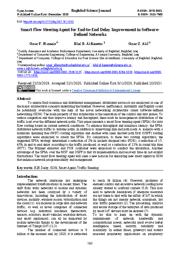A copy of this work was available on the public web and has been preserved in the Wayback Machine. The capture dates from 2021; you can also visit the original URL.
The file type is application/pdf.
Smart Flow Steering Agent for End-to-End Delay Improvement in Software-Defined Networks
2020
Baghdad Science Journal
To ensure fault tolerance and distributed management, distributed protocols are employed as one of the major architectural concepts underlying the Internet. However, inefficiency, instability and fragility could be potentially overcome with the help of the novel networking architecture called software-defined networking (SDN). The main property of this architecture is the separation of the control and data planes. To reduce congestion and thus improve latency and throughput, there must be
doi:10.21123/bsj.2021.18.1.0163
fatcat:s5vrerwwnbg2lpxyqpje33bhbi

